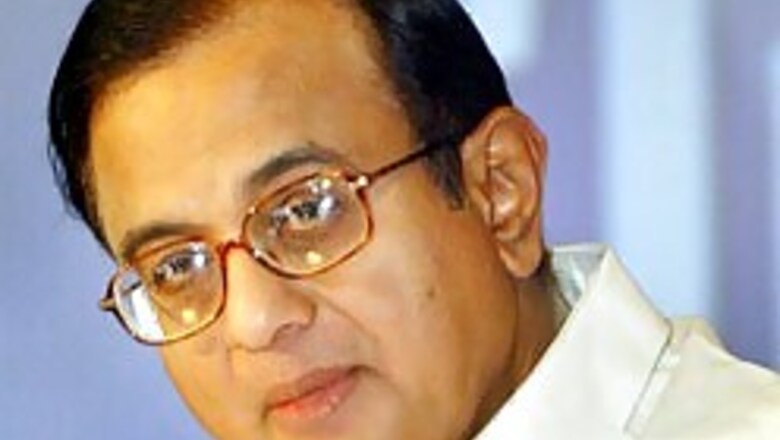
views
Mumbai: The following measures are under consideration for 2008-‘09 Union Budget, according to newspaper reports.
Finance Minister P Chidambaram will present the Budget for 2008-09 on February 29.
*The government is set to increase the corpus of the Rural Infrastructure Development Fund by Rs 20 billion to Rs 140 billion in the forthcoming Budget. The corpus of the fund was increased to Rs 120 billion from Rs 100 billion in the last Budget.
* The Rail ministry is likely to announce a slew of freight incentives, aimed at producers of bulk commodities, such as allowing customers to construct 'bulk terminals' which would allow storage and transportation of a specific commodity.
* The government is considering a proposal to grant the 'declared goods' status to natural gas and biofuels, making these petroleum products eligible for a lower and uniform sales tax across the country.
* The government is considering extending tax exemption for companies setting up ultra mega power projects by seven year. The exemption, which under current rules will end in 2010, may be extended to 2017.
* Oil firms engaged in the exploration and production work are likely to be exempted from the 12 percent service tax.
*The finance ministry is neither planning a hike nor a reduction in excise duty, which is currently levied at 16 percent.
*Leather, textile, marine and handicrafts sectors are likely to get an extension of the 2 percent subvention in export credit for another year. *
*Information Technology ministry seeks duty cuts on electronic and IT goods used by the hardware and software industry. A reduction of excise duty from 16 percent to 12 percent likely to be announced.
* Service Tax rate likely to be unchanged; currently the service tax rate is 12 percent.
* The government may revise the method of calculation of excise duty on cement, resulting in lower payouts, and waive import duty on coal and pet coke; key inputs in the making of cement.
* The corporate tax rate, which stands at 33.9 percent, including surcharge and cess, may be lowered by abolishing the surcharge. The government may also reduce the number of exemptions, which help companies reduce their tax burden.
* The bar for consumption loans for farmers may be raised by more than 50,000 rupees, on a backdrop a wave of suicides in the farming community that has rattled the government.
* Value-added tax for LPG and other declared goods, edible oils, bread, ready-made garments and intermediate goods may be raised to 5 percent from the present 4 percent, to offset revenue loss the states incur due to lower central sales tax.
* Taxi, bus fleet owners and contractors providing raw materials, electrical work and furniture in civil constructions are likely to come under the presumptive income tax net.
* Corporates may have to pay tax on capital income arising from money forfeited as part-payment for their shares.
* The government is considering waiving securities transactions tax (STT) on unexercised options in the derivatives market.
* The Goods and Services Tax (GST) rate and structure may be announced. The Central Sales Tax (CST) rate may be cut by 1 percent to 2 percent and completely withdrawn by 2010-2011 once the GST is in the final implementation phase.
* The government may increase the notified area under the local urban development authority from the present 8 kilometres, allowing it to impose capital gains tax on sale of agriculture land, that has not been used for more than two years for farming.
PAGE_BREAK
* The government may raise the limit for Viability Gap Funding (VGF) to 30 percent from 20 percent for urban transport systems like metro, monorail and road rapid transport system. VGF is a one-time grant by the government to an infrastructure project with a long gestation period to improve its viability.
* Interest or dividend earned on infrastructure bonds issued by commercial banks may be exempted from tax. * The existing 10 percent surcharge on personal and corporate income tax may be halved or scrapped, reducing the burden of a certain category of individuals, firms and companies between 1.54 to 3.09 percent.
* The Tirupur Exporters Association in a pre-budget memorandum to the finance ministry has sought to raise the depreciation on plant and machinery to 25 percent and wants service tax and fringe benefit tax on sales promotion expenses to be removed.
* The government may announce a new fund for providing subsidised loans to companies for adoption of energy-efficient and non-oil technologies, according to a survey by Federation of India Chambers of Commerce and Industry.
* Oil companies seek review on the customs and excise duty structure on oil and oil products.
* A pension scheme for widows, disabled and old people below the poverty line. The government is also planning to reduce the minimum age for beneficiaries of pension living below the poverty line to 60 years from 65.
*The government may remove regulatory restrictions on payments received by foreign companies from their Indian partners, joint ventures and subsidiaries for providing funds and technical assistance.
* The finance ministry may revive tax benefits for real estate developers for constructing houses for the economically weaker sections.
* About a dozen new services such as legal draft writing and stamp paper vending, all unaided non-government schools, colleges and hospitals and recreation and amusement parks, may be brought under the service tax net.
* Interest earned on external commercial borrowings may be taxed, making foreign debt more expensive and help moderate the surplus on the capital account - expected to touch $103 billion this fiscal. * Duties on life-saving medicines used in the treatment of cancer, AIDS and diabetes may be exempted.
* The federal civil aviation minister has demanded rationalisation of aviation tax structure, a cut in sales tax on aviation turbine fuel and scrapping of service tax on business and first-class tickets for Indian international carriers.
*The standard tax deduction limit for individual tax payers may be raised 20 percent to 120,000 rupees, allowing a taxpayer to save up to 2,000 rupees in taxes every year.
* Indirect taxes on consumer goods may be moderated to boost consumption.
* Imported set top boxes may attract a customs duty of 5 percent, in a move to encourage domestic goods.
* Public sector banks may be exempt from fringe benefit tax on their contribution to statutory pension funds.
* Duties on consumer electronics goods may be cut to 12 percent from 16 percent.
* Pass-through status for venture capital funds investing in food processing industry and infrastructure facilities such as warehouses may be restored. The status allows tax exemption for earnings of VC funds.
* Personal income tax exemption limit is likely to be raised to 1.25 lakh rupees a year from 1.1 lakh rupees. Taxable income of up to 1.5 lakh rupees may continue to attract 10 percent income tax.
* The government is considering a proposal to waive taxes on the provisioning of non-performing (NPA) assets by banks, especially on farm sector lending. NPA provisioning is taxed at the rate of 30 percent now.
* The 5 percent customs duty for liquefied natural gas used as fuel in power generation projects is likely to be withdrawn.
Reuters has not verified the stories, collated from The Economic Times, Financial Express, Mint, Times of India and Business Standard, and does not vouch for their accuracy.




















Comments
0 comment